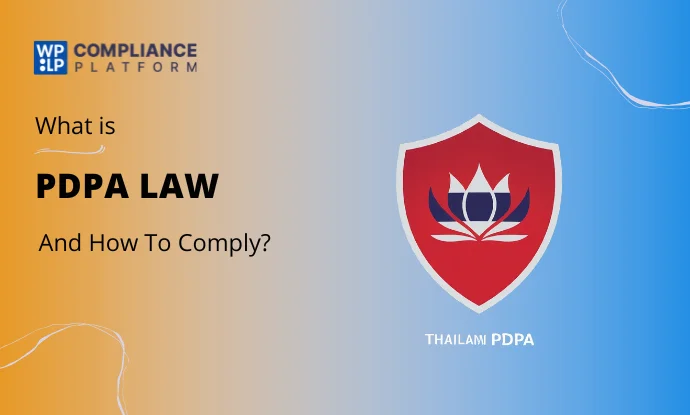Thailand’s Personal Data Protection Act (PDPA)

Are you aware of the regulations governing personal data in Thailand?
The Thailand Personal Data Protection Act (PDPA) plays a crucial role in safeguarding individuals’ rights and privacy regarding their data.
From its coverage to compliance and potential penalties for non-compliance, the PDPA seeks to bring about a significant shift in data protection standards in Thailand.
Let’s explore the critical aspects of the Thailand Personal Data Protection Act and understand who needs to comply with this essential law.
What is the Thailand Personal Data Protection Act (PDPA)
The Thailand Personal Data Protection Act (PDPA) is a comprehensive data protection law enacted in May 2019 to regulate the collection, use, and disclosure of personal data in Thailand.
The PDPA aims to protect individual’s rights regarding their data and establish obligations for data controllers and processors regarding the handling of personal data.
Under the PDPA, individuals can access, correct, delete, and port their data. Data controllers must obtain consent before collecting personal data, ensure data security measures are in place, and comply with data subject rights.
The PDPA also establishes rules for cross-border transfers of personal data and a Personal Data Protection Committee to oversee compliance and enforcement.
Overall, the PDPA is designed to enhance data protection standards in Thailand and align with international data protection principles.
To Whom Does the Thailand PDPA Law Apply?
Any individual or entity that gathers, utilizes, discloses, or shares personal data within Thailand for commercial reasons is subject to the Data Privacy Act of Thailand, with the following exceptions:
- Credit bureaus
- Public interest organizations
- The House of Representatives, the Senate, and the Parliament;
- Government agencies.
Suppose overseas-owned businesses based outside of Thailand gather, use, or disclose personal information on Thai citizens while providing goods or services to Thai citizens or monitoring behavior occurring in Thailand. In that case, they are likewise subject to the PDPA.
The personal information gathered must be used commercially. PDPA protection does not apply to data collected for personal or domestic use.
What Does the Thailand PDPA Include?
The PDPA covers a wide range of subjects, including the gathering, using, disclosing, and processing of personal data.
It covers, in particular, guidelines for permission, rights of data subjects, data breaches, and sanctions for noncompliance.
The PDPA applies to domestic and international organizations handling Thai citizens’ data.
Thailand’s Personal Data Protection Act seeks to safeguard people’s rights and privacy by handling personal data fairly and securely.
Who Needs to Comply With The Thailand PDPA Law
Thailand’s Personal Data Protection Act (PDPA) requires specific individuals and organizations to comply with its regulations.
These entities include data controllers and processors responsible for collecting, processing, and storing personal data of Thai citizens or those in Thailand.
This includes companies, government agencies, and other organizations that handle personal data in various forms, such as customer information, employee data, and user data from online services.
Additionally, any organization that processes personal data in Thailand, regardless of its physical location, must comply with the PDPA.
How Can Businesses Comply With the Thailand Protection Act?
Businesses must update their cookie and privacy policies to comply with the Thailand Personal Data Protection Act. This includes appropriately informing users about data collection.
Implementing a consent management platform with an adequately configured consent banner is essential to meet legal requirements for opt-in and opt-out.
Additionally, consider including a Data Subject Access Request (DSAR) form on your website to facilitate users’ requests for more information about their rights.
This is where the WP Legal Pages Compliance Platform comes in. This platform grants you access to both legal pages and Cookie Consent for your website.
WP Legal Pages

WP Legal Pages is a WordPress plugin designed to help website owners create essential legal policy pages, such as privacy policies, terms and conditions, and disclaimers.
WP Cookie Consent

The WP Cookie Consent is a WordPress plugin that enables website owners to create customizable cookie consent banners, ensuring that users are informed about data collection and obtain their consent, thus helping businesses comply with data protection regulations such as GDPR and PDPA.
Penalties and Fines for Non-compliance of Thailand Data Privacy Law
Thailand has passed the Thailand Personal Data Protection Act (PDPA) to secure personal data in the digital age. Violations will result in strict fines and punishments.
The penalties for breaking the law include a fine of up to 5 million Thai baht (about USD 150,000) and/or up to a year in jail. Moreover, repeat offenders risk a punishment of up to 10 million Thai baht, approximately USD 300,000, or up to two years in jail.
Organizations are required to comply with the PDPA to avoid these fines.
FAQ
Under the Personal Data Protection Act Thailand, consent must be given in written form, and the users must be informed about the purpose of the data collection.
Website owners who do not comply with the Thailand Personal Data Protection Act will be fined 5 million Thai baht and can also be imprisoned for up to one year.
Any unauthorized access or collection of personal data without consent violates Thailand’s Data Privacy Act.
There are 11 obligations under the Thailand Personal Data Protection Act.
Conclusion
Thailand’s extensive Personal Data Protection Act gives citizens enhanced control over collecting, processing, and using their data.
If you are subject to the PDPA, update your privacy policy to comply with the law’s requirements.
We recommend using the WP Legal Pages Compliance Platform to stay updated on the Thailand Personal Data Protection Act.
The WP Cookie Consent plugin helps you create a cookie banner on your website and obtain explicit consent from users. In contrast, WP Lega Pages helps you create your website’s legal policies, such as privacy policies.
If you liked this article, you can also consider reading:
- LGPD: A Guide to Brazil’s General Data Protection Law
- American Privacy Rights Act (APRA)
- What Is the Gramm Leach Bliley Act (GLBA)?
Do you want to design a beautiful cookie consent banner or a detailed privacy policy for your website? Grab the WP Legal Pages Compliance Platform now!
